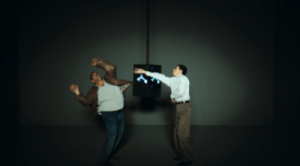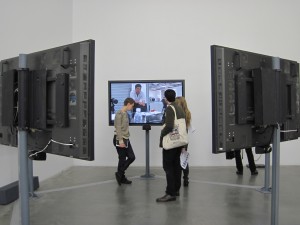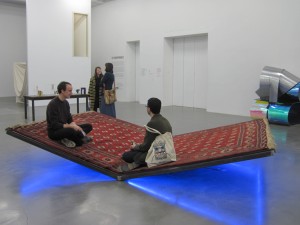Can a museum exhibition claiming to “embrace the energy of this generation’s (international artists in their 20s and 30s) urgencies” compete with still fresh images and reports of Arab Spring or Occupy Wall Street protests? While socially aware, The New Museum’s second Triennial, ‘The Ungovernables’ demonstrates less of a radical edge than a persistent questioning of the status quo and power structures in artists’ home countries around the world. More of a chipping away than an uprising, for better or worse the show largely dispenses with aesthetic pleasure or craftsmanship in favor of often personal engagements with broader cultural or national identities.
The standouts include:
Hassan Khan, b. ’75, lives Cairo. Jewel, ’10 – This mesmerizing video choreographing a two-man dance-off in traditional Cairo style is the show-stopper.

Cinthia Marcelle, b. 74, Brazil. The Century, ’11 – Barrels, hardhats and more objects are hurled down a street in a video orchestrated by Marcelle, offering some of that talked about urgency and exciting the senses but without reference to any particular conflict.
The Propeller Group, founded 2006, Ho Chi Minh City. TVC Communism, ’11 – On a circle of five monitors, five ad execs from an international agency hired by the Group hash out the intricacies of rebranding Communism, a fascinating conjuncture between competing ideologies.

Pilvi Takala, b. 81, lives Amsterdam and Istanbul. The Trainee, ’08 – For a month, Takala posed as an intern at an accounting firm raising the ire of fellow workers as she sat motionless at a desk or rode the elevator. Their irritation seems to be the point, and while this illumination of social and workplace expectations yields results that are hardly surprising, it’s an amusing scenario for us, especially when Takala tells chagrined employees that she’s ‘working in her head.’
Jose Antonio Vega Macotela, b. ’80, lives Amsterdam, Mexico City. Time Divisa ’10 – Over a four-year period, Vega Macotela exchanged labor with Mexico City prison inmates, completing agreed upon assignments simultaneous that included smuggling in items in return for a map showing the route that 100,000 pesos took inside the prison.

Slavs and Tatars, founded 2006, Eurasia. Prayway, ‘12 – A communal, ‘riverbed’ seat by the collective Slavs and Tatars appears to be an enormous folded sheet of metal resembling an open (prayer) book with a Persian rug arranged on top and a blue neon glow beneath – a Star-Trek channeling exercise in incongruity that should get conversation started.